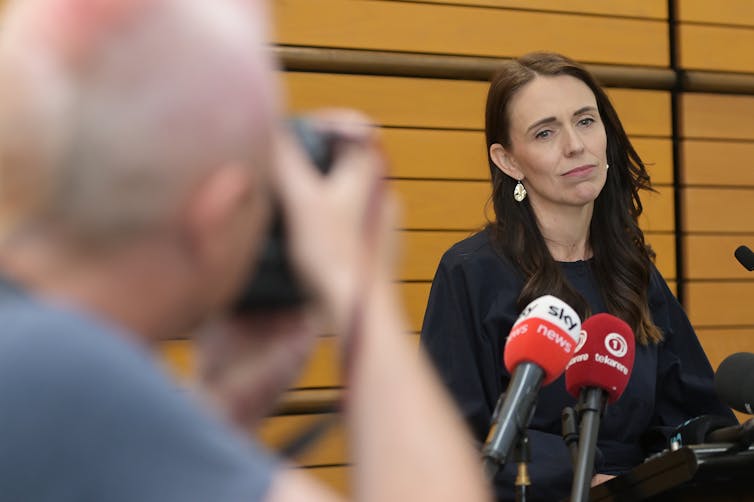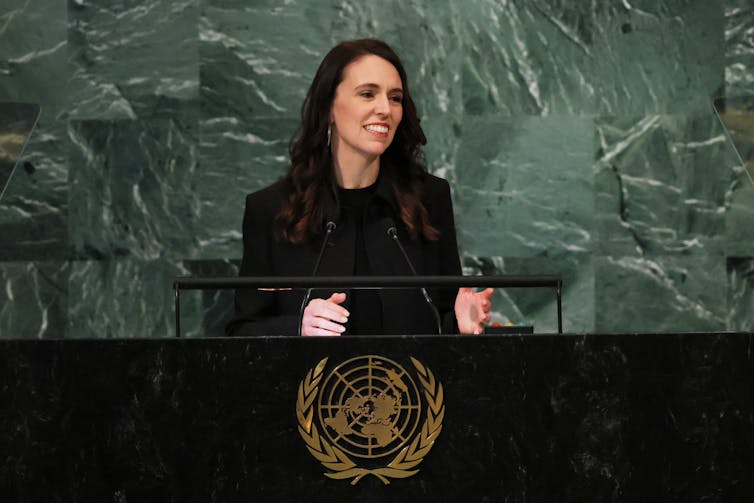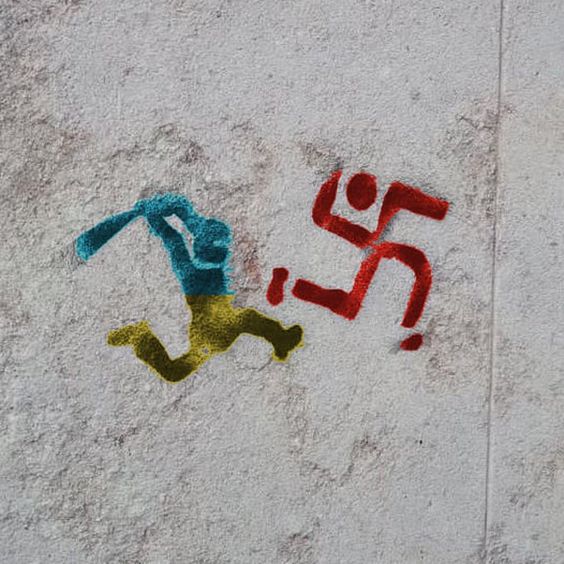
After the mosque attacks, my then 8-year-old wrote to Jacinda Ardern, thanking her for being Prime Minister and saying she thought it was a good idea to ban the dangerous guns. Today seems like a good day to re-post the letter she got back a few days later. pic.twitter.com/MLijSv5FYd
— Rachel Prozac 💉💉💉 💉💉 (@rachelz) January 19, 2023
Politics aside, here’s a small thing about Jacinda Ardern I admire that I think speaks to her good character. It’s about this painting in her office, which I’ve circled in red. (1/?) pic.twitter.com/mpa8W5YYzn
— Charlie Mitchell (@comingupcharlie) January 19, 2023
Richard Shaw, Massey University
Well, no one saw that coming. For those in New Zealand relieved that Christmas is over because it means politics resumes, this week held the promise of a cabinet reshuffle, the possible unveiling of some meaty new policy, and, if we were really lucky, the announcement of the date of this year’s general election.
We got the last of these (it will be on October 14). What we also got, however, was the announcement that in three weeks, one of the most popular – and powerful – prime ministers in recent New Zealand history will be stepping down.
It isn’t difficult to divine why Jacinda Ardern has reached her decision. As she put it:
I believe that leading a country is the most privileged job anyone could ever have but also one of the more challenging. You cannot and should not do it unless you have a full tank plus a bit in reserve for those unexpected challenges.
🔴 #BREAKING: New Zealand Prime Minister Jacinda Ardern will not seek re-election and has revealed the date she will stand down https://t.co/UET5ZoszD1 #Newshub pic.twitter.com/fPAROdI5l2
— Newshub (@NewshubNZ) January 19, 2023
She has had more than her fair share of such challenges: a domestic terror attack in Christchurch, a major natural disaster at Whakaari-White Island, a global pandemic, and, most recently, a cost-of-living crisis.
On top of that, she has had to chart a way through the usual slate of policy issues that have bedeviled governments for decades in this country, including the cost of housing, child poverty, inequality, and the climate crisis.
But it isn’t just about the policy. Along with other women politicians, Ardern faces a constant barrage of online and in-person abuse – from anti-vaxxers, misogynists, and sundry others who don’t like her.
As others with direct experience of this have written, the deterioration in civic discourse in New Zealand has been profound and disturbing, especially since the violent occupation of the parliamentary precinct in early 2022.
Ardern has spent the past two years on the frontline of this toxicity. This has taken a toll – on her, her family, and those close to her – and has played a part in her decision.

A tale of two legacies
In time, however, what people will remember most about Ardern’s term in office is the manner of her response to serious crises. She has faced more than any other New Zealand prime minister in recent history and, in the main, has responded with calmness, dignity, and clarity.
There are always competing points of view on these matters, of course. But her refusal to engage in the rhetoric of abuse or disparagement (her recent reference in parliament to an opposition MP as an “arrogant prick” aside), which has become the stock-in-trade of too many elected representatives, has marked her out in a world in which abuse has become normalized in politics.
Critics may deride this as a “mere performance.” But politics is – above all else – a matter of controlling the narrative. And for a long time, Ardern and her team were very good at this.
That said, there is plenty she hasn’t achieved. She came to promising power transformation, but inequality and poverty remain weeping sores on the body politic. Her Labour government hasn’t been able to alleviate the chronic shortage of public housing that has existed for many years, and workforces in public health, education, and construction face challenges no future government will relish.

No obvious successor
Attention now turns to Labour’s leadership and the party’s caucus vote this Sunday. A majority of 60% plus one more vote is required to secure the position, and Labour hopes this is what happens.
If not, the party’s constitution requires it to establish an electoral college comprising the caucus (which gets 40% of the total vote), the wider party membership (40%), and affiliate members (20%). This would be time-consuming, potentially divisive, and a distraction. Look for a clear-cut decision to be announced on Sunday.
The other big surprise has been financing minister and Ardern’s deputy Grant Robertson ruling himself out of the contest. Many people assumed he was the logical successor, but his decision opened the field wide.
Even including Ardern’s inner circle of David Parker, Chris Hipkins, and Megan Woods, the bench is not that deep, and none of the candidates has anything like Ardern’s wattage. The shoes needing filling are on the large side of big.
Australian PM Anthony Albanese said she has “shown the world how to lead with intellect and strength”. https://t.co/Mkg8u82vxL
— Stuff (@NZStuff) January 19, 2023
Mixed news for the National
Unsurprisingly, Ardern’s announcement has dominated the news cycle in New Zealand, leaving no room for consideration of another important event this week – the National Party’s first caucus of the year.
On hearing news of Ardern’s resignation, one might imagine there might have been jubilation in some sections of the party. Labour’s polling has been falling for some time now, while support for center-right parties National and ACT have been climbing.
Ardern is still significantly more popular than National’s leader, Christopher Luxon, and he will likely be quietly pleased he won’t have to face Ardern on the campaign trail. She was good at that stuff; he is still learning.
Also, National will think that some of the support for Labour tied to Ardern herself – including the support Labour received in 2020 from people who habitually vote for National – can now be peeled off and brought home.
Wider National heads will counsel caution, however. As the COVID years have rolled by, Ardern has become increasingly polarising. By stepping aside now, she gives her party plenty of time to install a new leadership group that can draw a line under the past three years and focuses on the future.
It’s far too soon to tell if the country will buy a new narrative in which Ardern is not the key character. But she is giving Labour every chance of having a decent crack at it.

Leaving on her terms
Are there broader lessons in all of this for international audiences? Depressingly, perhaps the key one concerns the price paid by elected representatives in these times of polarisation and the normalization of abuse. Around the world, women politicians, in particular, have borne the brunt of the toxicity, and many will see in Ardern’s departure a silencing of a woman’s voice.
On the upside, perhaps there are also things to be learned about the exercise of political leadership. Ardern has chosen the time and manner of her leaving – she has not lost the position because of internal ructions or an election loss.
Her reputation will be burnished as a result. If anything, it will generate even more political capital for her – although whether or not she chooses to distribute that currency on the international stage remains unclear. But you rather suspect she might at some point.
For now, though, she will be looking forward to walking her child to school and finally being able to marry her long-term partner. After a tumultuous and more-than-testing time in office, that may be rewarding enough.![]()
Richard Shaw, Professor of Politics, Massey University
This article is republished from The Conversation under a Creative Commons license. Read the original article.




27 Comments
Pingback: musica para treinar
Pingback: deep nude
Pingback: coffee shop ambience
Pingback: ทัวร์ธุรกิจจีน
Pingback: 86kub
Pingback: Best magic mushrooms online USA
Pingback: เว็บปั้มวิว
Pingback: steenslagfolie
Pingback: dultogel 777
Pingback: Herbalife
Pingback: ตกแต่งสวน
Pingback: พลาสติกวิศวกรรม
Pingback: เช่าห้องเก็บของ
Pingback: โคมไฟ
Pingback: hit789
Pingback: kc9
Pingback: Aviation Tire
Pingback: poト訴 na
Pingback: http://aviatorwebsiteindia.org/
Pingback: รับผลิตสปริง
Pingback: ไซด์ไลน์
Pingback: DeepBLOK ระบบสมาชิก
Pingback: เช่าเครื่องสเลอปี้
Pingback: ลงทุนไปกับ lsm99love
Pingback: แทงบอล ufa11k
Pingback: เว็บบาคาร่า168
Pingback: website